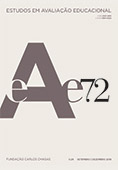Class council with student participation: understandings about learning evaluation
DOI:
https://doi.org/10.18222/eae.v29i72.4907Keywords:
Class Council, Student Participation, Learning Assessment, Teacher-Student RelationshipAbstract
This article aims to analyze student participation in class councils and its possible meaning for learning evaluation. It was based on the understanding that such participation and interaction with teachers in this context can constitute an essential element which favors student autonomy and development, as well as other learning and evaluation practices. Based on qualitative research, a case study was carried out in a school with a class council having student participation. The understandings of the subjects in the class council reveal that student participation can provide a more horizontal relationship, dialogue and negotiation between teachers and students. This favors reflections and changes in the subjects that comprise the teaching and learning process.
Downloads
References
ÁLVAREZ MÉNDEZ, Juan Manuel. Avaliar para conhecer, examinar para excluir. Tradução de Magda Schwartzhaupt Chaves. Porto Alegre: Artmed, 2002.
BARDIN, Laurence. Análise de conteúdo. Tradução de Luís Antero Reto e Augusto Pinheiro. ed. revista e actualizada. Lisboa, Portugal: Edições 70, LDA, 2009.
CHIZZOTTI, Antonio. Pesquisa em ciências humanas e sociais. 8. ed. São Paulo: Cortez, 2006.
CRUZ, Carlos Henrique Carrilho. Conselho de classe: espaço de diagnóstico da prática educativa escolar. 3. ed. São Paulo: Edições Loyola, 2015.
DALBEN, Ângela Imaculada Loureiro de Freitas. Conselhos de classe e avaliação: perspectivas na gestão pedagógica da escola. Campinas, SP: Papirus, 2004.
FREIRE, Paulo. Pedagogia do oprimido. 59. ed. rev. e atual. Rio de Janeiro: Paz e Terra, 2015.
GIL, Antonio Carlos. Como elaborar projetos de pesquisa. 5. ed. São Paulo: Atlas, 2010.
HADJI, Charles. Avaliação desmistificada. Tradução de Patrícia C. Ramos. Porto Alegre: Artmed, 2001.
HOFFMANN, Jussara. Avaliação mediadora: uma prática em construção da pré-escola à universidade. 33. ed. Porto Alegre: Mediação, 2014.
LUCK, Heloísa. A gestão participativa na escola. 11. ed. Petrópolis, RJ: Vozes, 2013. (Séries Cadernos de Gestão).
LUCKESI, Cipriano Carlos. Avaliação da aprendizagem escolar: estudos e proposições. 19. ed. São Paulo: Cortez, 2008.
MAGNATA, Rubia Cavalcante Vicente; SANTOS, Ana Lúcia Félix dos. Avaliação formativa da aprendizagem: a experiência do conselho de classe. Estudos em Avaliação Educacional, São Paulo, v. 26, n. 63, p. 768-802, set./dez. 2015. PERRENOUD, Philippe. Avaliação: da excelência à regulação das aprendizagens – entre duas lógicas. Tradução de Patrícia Chittoni Ramos. Porto Alegre: Artes Médicas Sul, 1999.
SANTOS, Almir Paulo dos. Aluno sujeito da avaliação: conselho de classe participativo como instância de reflexão. Roteiro, Joaçaba, SC, v. 35, n. 2, p. 299-318, jul./dez. 2010. Disponível em: <http://www.periodicos.capes.gov.br>. Acesso em: 11 fev. 2016.
SILVA, Janssen Felipe da. Avaliação educacional do trabalho pedagógico docente: fundamentos teóricos e implicações metodológicas. In: CRUZ, Fátima Maria Leite (Org.). Teorias e práticas em avaliação. Recife: Editora Universitária da UFPE, 2010.
Downloads
Published
How to Cite
Issue
Section
License
Copyright (c) 2018 Estudos em Avaliação Educacional

This work is licensed under a Creative Commons Attribution-NonCommercial 4.0 International License.
Authors who publish in this journal agree to the following terms:
a. Authors retain the copyright and grant the journal the right to first publication, with the paper simultaneously licensed under the Creative Commons Attribution License (CC BY 4.0) license that allows the sharing of the paper with acknowledgment of authorship and initial publication in this journal.
b. Authors are authorized to assume additional contracts separately, for non-exclusive distribution of the version of the paper published in this journal (for example publishing in institutional repository or as a book chapter), with acknowledgment of authorship and initial publication in this journal.
c. Authors are allowed and encouraged to publish and distribute their paper on-line (for example in institutional repositories or on their personal page) at any moment before or during the editorial process, as this can generate productive changes, as well as increase the impact and citation of the published paper (See The Effect of Open Access).








